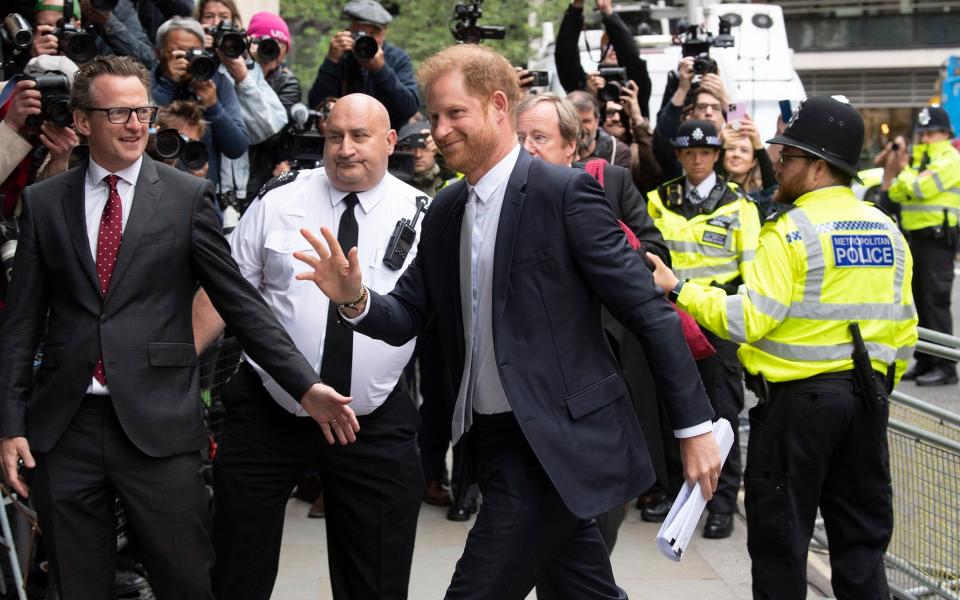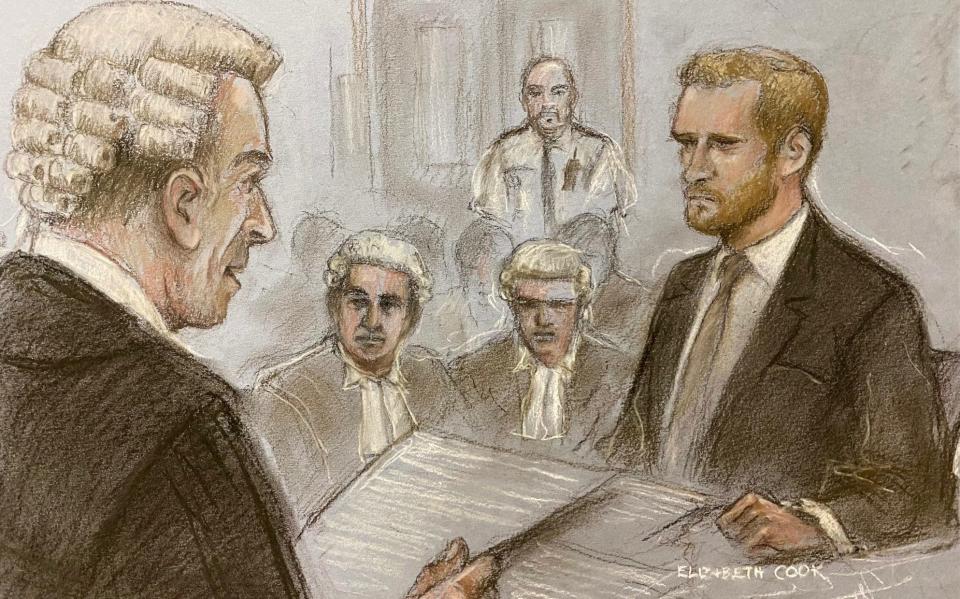Prince Harry was emboldened for his second day in court – but still couldn’t land a punch

Perhaps he had a pep talk from Meghan.
Perhaps he was given a pat on the back by his legal team or perhaps he simply felt rejuvenated after a good night’s sleep.
Whatever the reason, the Duke of Sussex came out fighting as he returned to Court 15 on Wednesday for Round Two with the Mirror’s highly experienced barrister Andrew Green KC.
The new approach was apparent from the moment he arrived at court, smiling and waving at onlookers.
He strolled into the second floor court looking notably relaxed and demonstrated his new-found confidence from the get-go.
As Mr Green skipped the pleasantries to launch immediately into his case, Prince Harry interrupted him mid flow.
“Good morning, Mr Green,” he said, pointedly.
The emboldened Duke continued in a similar vein.
Gone were the nervous tics of Tuesday, the obvious signs of tension and the curt answers.
Instead, came expansive answers, uninvited statements and repeated challenges to Mr Green’s claims as he ploughed on through his case.
Did he believe there was any public interest in the fact that he might get preferential treatment at Sandhurst?
“I don’t believe it affected the wellbeing of society,” came the slightly snarky reply.
The story in dispute concerned the fact that Harry had delayed his entry to Sandhurst to recover from a knee injury.
Several minutes were devoted to a statement released by Clarence House months earlier that had described the knee injury and included a quote from Harry himself.
But the royal claimant didn’t like the way it was going and tried to take matters into his own hands.
“My Lord, I could save a lot of time by talking about the article itself as opposed to just the injury,” he told Mr Justice Fancourt.

The judge deftly batted off the plea but Harry’s new-found confidence appeared to rattle Mr Green.
“Can I repeat what I told you yesterday?” he snapped at one point. “This is not about you asking me questions, it’s about me asking you questions.”
The barrister continued to push on through the remaining articles that make up Harry’s claim – a romp through some traditional tabloid fodder of old including Harry’s visits to Spearmint Rhino (he did have a lap dance, he conceded, but it wasn’t a Chelsy Davy lookalike), and nights out with blonde PR guru Astrid Harbord with whom, he was at pains to point out, he did not have a relationship.
How often he attended nightclub
There was some debate about how often he attended Amika, a west London nightclub – “I wouldn’t say I was there once a month” – and whether Army cadets were expected to do five-mile runs during their first week at Sandhurst.
A story suggesting that he had been banned from returning to Afghanistan was not about his private life, was it, Mr Green suggested.
“No,” the Duke replied, before swiftly adding: “Are you suggesting that while I was in the Army that everything was available to the press to write about?”
And so it went on.
But this was much bigger than a bit of lively legal sparring. On Wednesday, much more than Tuesday, Harry was keen to impress upon the judge quite how much distress these articles had caused.
He told the court that it was distressing going through the legal process and even more distressing sitting in the witness box.
The headline “Hooray Harry’s Dumped” was extremely hurtful and turned his split with Chelsy into a bit of a laugh, he said.
Mr Green carefully pointed out that the headline was not celebrating the demise of his relationship.
The barrister had long ago established that Harry could not actually remember reading most of the articles when they were published.
After being asked the question for the umpteenth time, Harry again conceded he couldn’t remember but added: “If that is to somehow suggest that the distress was somehow reduced it wasn’t. It hasn’t been.”
The Duke revealed that he believed “everything attributed to a palace source was obtained unlawfully”, a sweeping statement that would put many journalists in the dock.
He said to lose the case would be an “injustice” and claimed that phone hacking “started at the Mirror Group”.
But despite his confident stance, he again failed to land a punch.
Would phone theft be worth reporting?
A story about a phone stolen in Lesotho had been published on the Telegraph website the day before being published in the Daily Mirror.
Would theft against a senior royal be a matter of public interest worth reporting? “Yes, probably,” he agreed.
The Duke told the judge that his claim against the Mirror had begun with a chance encounter with David Sherborne, his barrister, in France.
Asked if he had previously harboured any concerns over criminality being behind any particular articles, he admitted he had not.
Mr Green was almost done. “You’ve never been able to identify any story in a Mirror Group paper that was clearly written from a message left on your phone,” he said.
The Duke said it was a question for his legal team before adding: “There is hard evidence to suggest an incredible amount of suspiciousness.”
Whether “suspiciousness” is enough remains to be seen.

 Yahoo Sports
Yahoo Sports 